| |||||
| Decades: | |||||
|---|---|---|---|---|---|
| See also: | Other events of 1898 Years in Iran | ||||
The following lists events that have happened in 1898 in the Qajar dynasty, Iran.
| |||||
| Decades: | |||||
|---|---|---|---|---|---|
| See also: | Other events of 1898 Years in Iran | ||||
The following lists events that have happened in 1898 in the Qajar dynasty, Iran.

The Qajar dynasty was an Iranian royal dynasty founded by Mohammad Khan of the Qoyunlu clan of the Turkoman Qajar tribe.

Mozaffar ad-Din Shah Qajar was the fifth Qajar shah of Iran, reigning from 1896 until his death in 1907. He is often credited with the creation of the Persian Constitution of 1906, which he approved of in one of his final acts as shah.

Naser al-Din Shah Qajar was the fourth Shah of Qajar Iran from 5 September 1848 to 1 May 1896 when he was assassinated. He was the son of Mohammad Shah Qajar and Malek Jahan Khanom and the third longest reigning monarch in Iranian history after Shapur II of the Sassanid dynasty and Tahmasp I of the Safavid dynasty. Naser al-Din Shah had sovereign power for close to 51 years.

Mohammad Ghaffari, better known as Kamal-ol-Molk, was an Iranian painter and part of the Ghaffari family in Kashan.

Prince Iraj Mirza, titled Jalāl-ol-Mamālek, was a prominent Iranian poet. He was the son of Prince Gholam-Hossein Mirza. Iraj Mirza was known for his modern poetry, which often critiqued traditional customs. In addition to his original works, he translated literary pieces from French into Persian.

Reza-Qoli Khan Hedayat was an Iranian literary historian, administrator, and poet in 19th-century Qajar Iran.
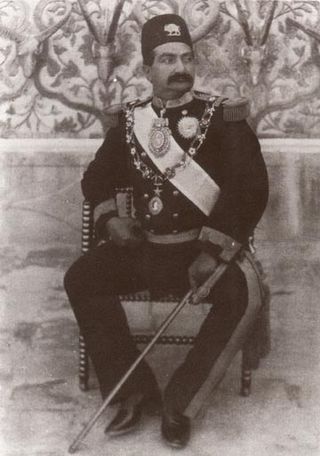
Mass'oud Mirza Zell-e Soltan, or Massud Mirza, was an Iranian prince of the Qajar dynasty; he was known as the "Yamin-od-Dowleh". He was posted as the governor of Isfahan for over 35 years, and the governor of Mazandaran, Fars, and Isfahan for a total of 40 years.

The "Royal Salute", also known as the "Health of the Shah", was the royal and national anthem of Qajar Iran between 1873 and 1909. The French musician Alfred Jean Baptiste Lemaire composed this anthem in 1873 on the orders of Naser al-Din Shah. It had no lyrics. Salâm-e Shâh was played in official ceremonies during the reigns of Naser al-Din Shah, Mozaffar ad-Din Shah and Mohammad Ali Shah. It was also played as the Persian (Iranian) national anthem during Naser al-Din Shah’s and Mozaffar ad-Din Shah’s European tours.
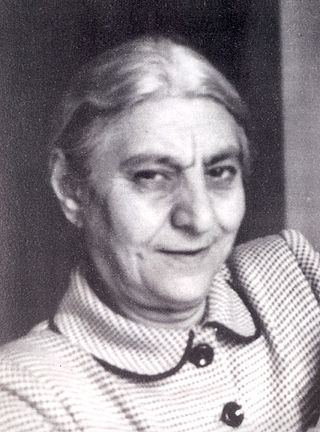
Princess Ashraf al-Muluk, titled Fakhr-ol-Dowleh (فخرالدوله) was one of the most prominent daughters of Mozaffar ad-Din Shah of the Qajar dynasty. She had a reputably strong character, to the point that she was even willing and able to confront Reza Shah for her patrimony and right.
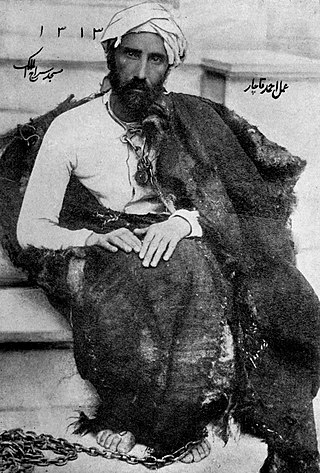
Mirza Reza Kermani was an adherent of Jamal al-Din al-Afghani and an Iranian who assassinated King Nasser-al-Din.
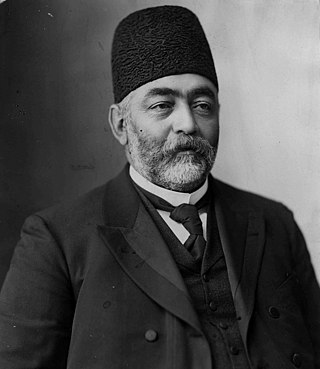
Mirza Ali Asghar Khan, also known by his honorific titles of Amin al-Soltan and Atabak, served as Prime Minister of Iran from 1887 to 1896 under Naser ed-Din Shah Qajar, from 1898 to 1904 under Mozaffar ed-Din Shah Qajar and from May 1907 until his assassination in August 1907 under Moahammad Ali Shah Qajar.

Kamran Mirza was a Qajar prince and third surviving son of Naser al-Din Shah Qajar. He was the brother of Mass'oud Mirza Zell-e Soltan and Mozaffar ad-Din Shah Qajar. Kamran Mirza also served as Iran's Commander-in-Chief, appointed in 1868 for the first time, and minister of war from 1880 to 1896 and from 1906 to 1907.
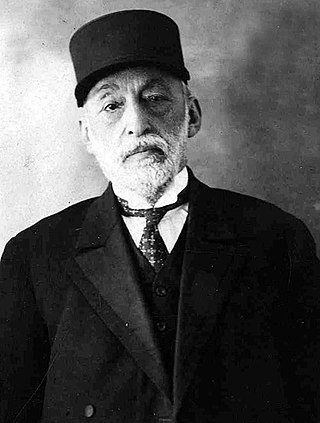
Mehdi Qoli Khan Hedayat, also known as Mokhber-ol Saltaneh, was Prime Minister of Iran and an author of several books on Iranian music, modern education, poetry, current affairs, and most notably a memoir covering his political tenure under the last 6 kings of Iran.

The 1st Iranian Majlis was a legislative assembly from October 7, 1906, to June 23, 1908. Its session was formally opened by Mozaffar ad-Din Shah Qajar.

Amanollah Khan Zia' os-Soltan was an Iranian aristocrat and politician at Qajar court during the time of Mozaffar ad-Din Shah, Mohammad Ali Shah and Ahmad Shah Qajar and hero of the Persian Constitutional Revolution.
The following lists events that have happened in 1896 in the Qajar dynasty.
The following lists events that have happened in 1907 in the Qajar dynasty.
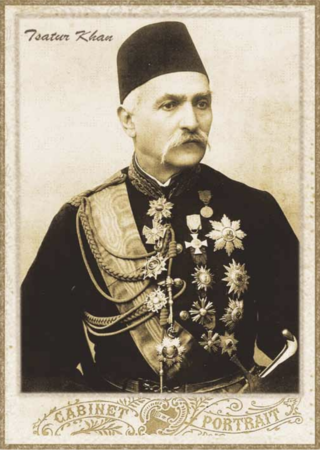
Tsatur Khan was an Iranian general, envoy to Russia, and advisor to Shah Mozaffar ad-Din Qajar, the fifth Qajar shah (king) of Iran. He was a close friend of Grand Duke Michael Nikolaevich of Russia.
Shokouh al-Saltaneh (19th-century) was a royal consort of Naser al-Din Shah Qajar of Iran.
The House of Amirsoleimani, also known as the Amirsoleimani-Qajar, is a distinguished Iranian princely family with roots in the Qajar dynasty, the ruling house that reigned Iran from 1785 to 1925. The family descends from Mussa Khan Qajar Qovanlou, and the family name stems from Amir Soleiman Khan Qajar Qovanlou, a prominent Qajar noble, whose descendants played significant roles within the royal court and administration during the Qajar period. Members of the Amirsoleimani family held various high-ranking positions, including key roles in the administration and court of Nasser al-Din Shah, Mozaffar ad-Din Shah, Mohammad Ali Shah, and Ahmad Shah.